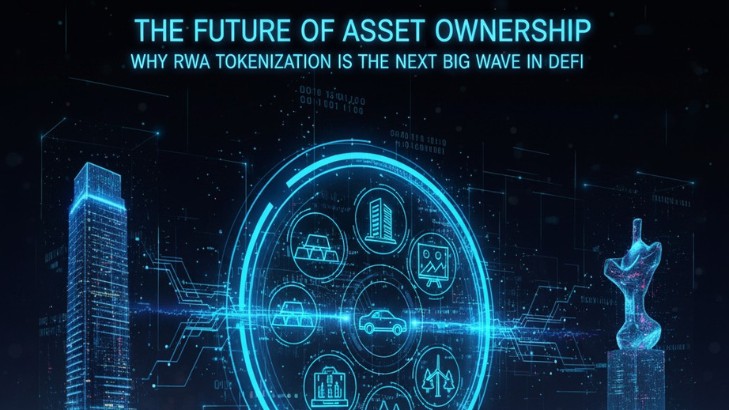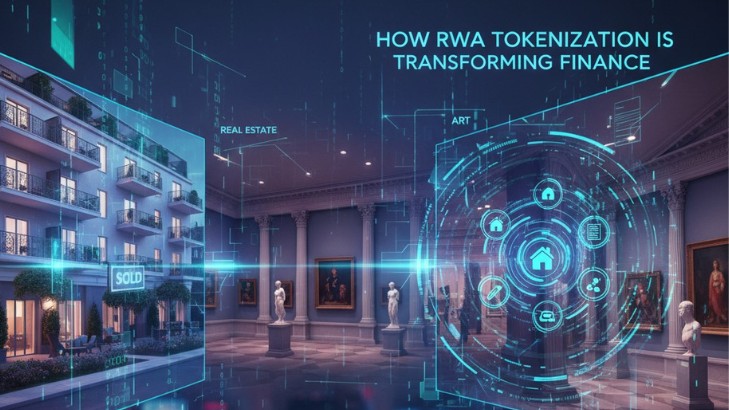Best Marketing Agency for Reg-D 506(c) Equity Crowdfunding
June 27, 2025



1. Introduction
Equity crowdfunding is evolving—and Reg-D 506(c) is leading the charge for serious capital raises.
If you're a founder or fund manager looking to raise large checks from accredited investors, Regulation D 506(c) gives you a powerful advantage. Unlike Reg CF or Reg A+, this exemption allows general solicitation—meaning you can publicly advertise your offering across the internet, social media, and paid platforms. But there’s a catch: you can only accept funds from verified accredited investors.
This changes everything.
While the marketing world is full of flashy agencies and creative freelancers, very few understand what it really takes to run a legally compliant and conversion-optimized 506(c) campaign. A traditional marketing agency won't cut it. You need a specialized equity crowdfunding agency that understands both the legal boundaries and the high-net-worth investor mindset.
Why? Because attracting accredited investors is not the same as selling sneakers or apps.
These are individuals who often have $1M+ in net worth or $200K+ in annual income. They don’t click impulsively. They don’t trust easily. And they definitely don’t respond to hype. To earn their attention—and their investment—you need a campaign that’s precise, compliant, and highly strategic. Think data-driven advertising, FINRA-safe copywriting, seamless investor funnels, and constant performance tracking.
In this guide, we’ll walk you through what makes a great Reg-D 506(c) marketing partner. You’ll learn:
- Why most agencies fail when it comes to equity crowdfunding
- What specific services a 506(c) campaign actually needs
- Which top-performing agencies dominate this space (and why)
- How to evaluate and select the right agency for your goals
Whether you’re raising capital for a real estate fund, tech startup, biotech opportunity, or fintech platform, this article will give you a roadmap for working with the right equity crowdfunding agency. One that doesn’t just bring in leads—but delivers qualified, accredited, and ready-to-invest prospects.
The stakes are high. The rewards are massive. And the right agency could be the difference between an underperforming raise… and a fully subscribed round with momentum to spare.
So if you're serious about raising under Reg-D 506(c), don’t rely on guesswork. Start with strategy. Partner with experts. And build an investor pipeline that actually converts.
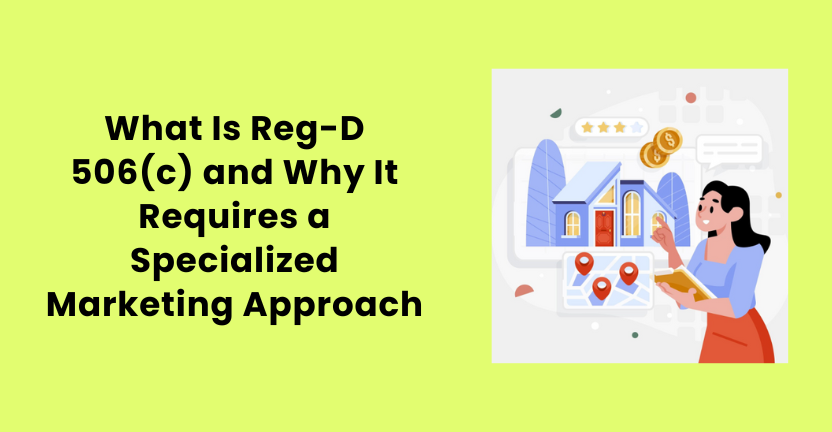
2. What Is Reg-D 506(c) and Why It Requires a Specialized Marketing Approach
Regulation D 506(c) has quickly become the go-to exemption for founders and fund managers who want to raise significant capital from accredited investors while marketing their offering to the public. But while it appears similar to other forms of equity crowdfunding on the surface, Reg-D 506(c) is in a class of its own—legally, strategically, and operationally.
Let’s unpack why.
Reg-D 506(c) vs. 506(b): What’s the Difference?
Both 506(b) and 506(c) are exemptions under Regulation D of the Securities Act, allowing companies to raise capital without registering their securities with the SEC. However, the marketing rules are dramatically different.
- Reg-D 506(b) does not allow general solicitation. You must already have a “substantive pre-existing relationship” with your investors, which significantly limits your ability to scale outreach.
- Reg-D 506(c), on the other hand, does allow public marketing, including paid ads, email campaigns, webinars, social media, and other forms of general solicitation.
But there's a tradeoff: every single investor must be a verified accredited investor, and you must take “reasonable steps” to ensure that verification is documented.
That one change—allowing general solicitation—means 506(c) opens the door to aggressive growth. But it also requires a highly specialized, tightly controlled marketing strategy.
Why 506(c) Marketing Demands a Different Playbook
Most marketing campaigns aim to maximize clicks, generate leads, and nurture conversions. But in the world of Reg-D 506(c) equity crowdfunding, the metrics that matter are very different.
You’re not selling a $99 product. You’re raising $500K, $5M, or even $50M from investors who are skeptical, cautious, and busy. You’re competing with every other deal in their inbox. And you have to do it while staying within strict SEC and FINRA rules.
This creates a unique set of challenges:
2.1. Legal Compliance Isn’t Optional—It’s the Foundation
In 506(c), your marketing is part of your offering. That means every claim, phrase, image, and headline is subject to SEC scrutiny.
Overpromising returns? That’s a red flag.
Using testimonials without proper disclaimers? Violation.
Quoting financials or projections without clear context? That could trigger enforcement.
You need an equity crowdfunding agency that understands FINRA, SEC no-action letters, and the nuances of securities marketing. This isn’t optional—it’s survival.
2.2. Targeting Accredited Investors Requires Precision
Facebook’s lookalike audiences and Google’s smart bidding work great for e-commerce. But when it comes to finding accredited investors, you can’t rely on standard algorithms alone.
Most platforms don’t let you target users by income or net worth directly. That’s why elite 506(c) agencies use third-party data, advanced retargeting, and proprietary filters to reach the right audience.
Ideal targeting filters include:
- Age: 35–65+
- Location: high-income ZIP codes
- Behavioral triggers: real estate investing, private equity, family office, VC interest
- Income proxies: luxury purchases, business ownership, CPA usage
A top-tier agency will also build custom landing pages and investor funnels tailored to these audiences. You can’t send a $500K investor to a Shopify-style product page.
2.3. Trust Is Everything
Investors are not leads. They’re not clicks. They’re real people risking real money. If your campaign doesn’t build trust instantly, they’re gone.
Your funnel must communicate:
- Credibility (through branding, team bios, and press mentions)
- Transparency (disclaimers, FAQs, clear risks)
- Legitimacy (verifiable documentation, investor decks, webinar recordings)
That’s why the best Reg-D equity crowdfunding agencies build comprehensive investor experiences—not just ad campaigns.
2.4. Conversion Funnels Must Be Investor-Ready
A generic contact form won’t cut it.
Your funnel should lead cold traffic through a tightly engineered investor journey:
- Ad Click → Awareness
- Landing Page → Lead Capture
- Email Sequence + Webinar → Trust Building
- Investor Room → Verification & Commitments
- CRM Integration → Personalized Follow-Up
This structure converts interested traffic into committed capital. It’s not about getting hundreds of thousands of leads. It’s about getting the right 30–50 investors who can fund your round.
How This Differs from Reg CF and Reg A+
While Reg CF and Reg A+ also fall under the umbrella of equity crowdfunding, they are designed for different goals and audiences.
- Reg CF targets everyday investors, often raising $50K–$5M in small contributions. It’s more retail-focused and community-driven.
- Reg A+ allows broader marketing and higher limits but requires more upfront compliance costs, including SEC qualification.
- Reg D 506(c) is laser-focused on accredited capital at scale, typically from high-net-worth individuals, family offices, and institutional investors.
This means the strategy, tech stack, copy, targeting, and funnel design for 506(c) must be far more refined and investment-oriented.
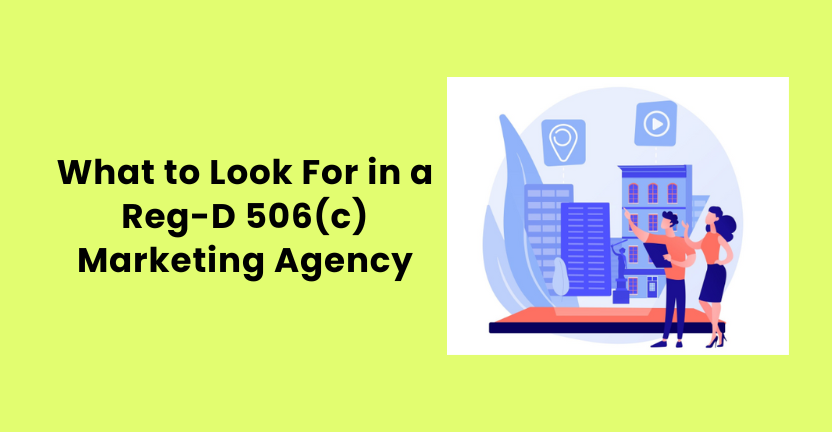
3. What to Look For in a Reg-D 506(c) Marketing Agency
Selecting the right equity crowdfunding agency for your Reg-D 506(c) campaign can make or break your capital raise. Unlike traditional marketing, where creativity and reach dominate, Reg-D 506(c) demands precision, compliance, and a deep understanding of high-net-worth investor behavior.
Too many founders make the mistake of hiring a general-purpose digital marketing agency and expecting them to deliver verified accredited investors. They quickly discover that impressions, clicks, and even leads do not translate into capital commitments—unless the campaign is engineered specifically for this environment.
So what should you be looking for when evaluating a Reg-D 506(c) marketing agency? Here’s what separates the pros from the pretenders.
3.1. Deep Knowledge of Securities Compliance
At the core of any 506(c) campaign is one thing: the law. Because general solicitation is permitted, your marketing materials are essentially part of your offering. That means everything you say—ads, emails, landing pages, even social media posts—must comply with SEC and FINRA advertising rules.
The right agency will have in-house compliance expertise or established workflows with securities attorneys. They won’t publish a single headline without reviewing it for risk exposure. They’ll know how to:
- Avoid promissory language
- Use appropriate risk disclosures
- Structure performance claims carefully
- Navigate testimonial restrictions
This is not optional. If your campaign triggers a regulatory inquiry or enforcement action, your raise can collapse—and your reputation may take years to recover.
3.2. Advanced Targeting for High-Net-Worth and Accredited Investors
Most ad agencies rely on algorithmic targeting through Meta or Google. That’s fine for e-commerce. But 506(c) raises require reaching a much narrower audience: accredited investors.
Because platforms don’t let you target by income or net worth directly, your agency must know how to build proxy audiences using:
- Behavioral data (e.g., real estate investing, venture capital, angel groups)
- Affinity interests (e.g., finance publications, investment platforms)
- Geo-targeting (e.g., high-income ZIP codes, financial hubs)
- Third-party data overlays for wealth signals
In addition, the best agencies will leverage retargeting, lookalike modeling, and email list segmentation to continuously refine who sees your campaign.
If an agency can't explain how they plan to reach accredited investors specifically, they're not the right fit for 506(c).
3.3. Funnel Creation from Cold Ad to Verified Investor
An effective Reg-D 506(c) campaign isn’t just about attracting attention. It’s about guiding each potential investor through a clear, conversion-focused journey that ends in verification and funding.
Your agency should be able to map out the full funnel:
- Paid Ads (on Meta, Google, LinkedIn) for awareness
- Investor Landing Page with SEC-compliant copy
- Lead Capture form that qualifies interest
- Automated Nurturing via email, SMS, or webinar invites
- Investor Room or Portal where they verify and commit
Each step must be intentional, integrated, and trackable. Agencies that treat this like a one-step landing page or basic lead gen form are missing the point.
You need a system that moves people from curiosity to conviction.
3.4. High-Converting Landing Pages with Legal Alignment
Your campaign landing page is not just a marketing asset—it’s a legal asset. It must be designed to convert and comply.
That means it should:
- Use institutional-grade branding and design
- Communicate the opportunity clearly without hype
- Include risk disclosures, FAQs, and disclaimers
- Offer downloadable pitch decks and investment terms
- Build instant trust with professional bios, past track record, and media mentions
A good agency will test different versions of your page, track conversion events, and optimize based on real investor behavior. This is about performance at every level—not guesswork.
3.5. Multi-Platform Ad Strategy: Meta, Google, LinkedIn
Relying on a single platform is a risky bet. Accredited investors consume media across multiple channels, so your campaign should meet them wherever they are.
The right agency will develop a multi-platform paid media strategy, including:
- Meta ads for storytelling and warm traffic
- Google Ads for high-intent search keywords
- LinkedIn campaigns for professional investor visibility
They’ll also have the infrastructure to test creatives, optimize bids, and rotate audiences. More importantly, they’ll constantly measure which channel drives actual investor interest—not just clicks.
3.6. Cold Investor Outreach (Optional but Powerful)
Some of the best-performing campaigns combine paid traffic with cold outreach via email, LinkedIn, and direct messaging. This is especially effective when targeting family offices, angel groups, or niche high-net-worth communities.
While not all agencies offer this, the best ones will provide tools or partnerships for:
- Cold email campaigns with compliance screening
- LinkedIn lead generation with personalized follow-up
- CRM-based automation and pipeline tracking
This outreach can dramatically accelerate fundraising by engaging serious investors directly.
3.7. Investor Nurturing Email Flows
High-net-worth individuals rarely invest on first contact. Your campaign must build trust over time—and that’s where a well-designed email sequence makes a major difference.
Your agency should create:
- Welcome emails that reinforce legitimacy
- Educational sequences explaining the investment thesis
- Event invites for webinars, pitch calls, or Q&As
- Deadline-driven nudges as the raise progresses
This isn’t a newsletter. It’s a conversion tool—carefully written, scheduled, and tested to move prospects toward verification and funding.

4. Biggest Mistakes Founders Make
Running a Reg-D 506(c) equity crowdfunding campaign is unforgiving. One missed detail can kill momentum—or worse, trigger an SEC inquiry that forces you to refund investors. Over the past decade, top equity crowdfunding agencies have audited hundreds of campaigns. The patterns are painfully consistent. Below are the critical errors founders and fund managers make, why they happen, and how to dodge them before they burn your raise.
4.1. Hiring a General-Purpose Marketing Agency
Many founders assume any performance-driven digital shop can handle investor acquisition. They see shiny portfolios, hear promises of low CPAs, and sign a retainer. Two months later, the funnel is full of unqualified leads who never verify. Why? A standard agency lacks:
- Securities compliance fluency. They don’t screen copy against FINRA guidance or interpret SEC no-action letters. One stray projection or testimonial in an ad headline can flag enforcement.
- Accredited-investor targeting know-how. Meta’s interest buckets for “angel investing” are shallow. Without third-party wealth overlays, you waste spend on enthusiastic but ineligible audiences.
- Investor-grade creative and funnel architecture. High-net-worth prospects judge credibility in seconds. Generic landing pages won’t earn a $100 K check.
Founders who choose price over specialization discover the most expensive agency is the one that fails to raise capital.
4.2. Overpromising in Ad Copy and Pitch Decks
Accredited investors are sophisticated. They have seen decades of pitch hyperbole. Yet founders still push “guaranteed returns” or “zero risk” language. That language breaks two things:
- Trust. Savvy investors exit the page the moment they smell puffery.
- Compliance. The SEC bars misleading statements. Fines and rescission rights follow.
Practical alternative: focus on verifiable traction, conservative forecasts, and transparent risk factors. It looks less exciting on Twitter, but it wins in the data room.
4.3. Neglecting Pre-Launch Audience Building
Too many campaigns launch ads on day one and hope cold traffic supplies momentum. Equity crowdfunding doesn’t work that way. Accredited investors require:
- Educational touchpoints explaining the thesis.
- Social proof—earned media, leadership bios, prior exits.
- Warm engagement before they receive a subscription agreement.
A 30- to 60-day pre-launch drip sequence—thought-leadership articles, podcast guest spots, targeted LinkedIn content—creates familiarity. When the raise opens, CPMs drop, conversion climbs, and due-diligence calls accelerate.
4.4. Skipping a Dedicated Investor Verification Workflow
Reg-D 506(c) requires “reasonable steps” to prove accreditation. Founders often bolt a generic HubSpot form onto their site and expect it to pass muster. Two things break:
- User friction. HNWIs hate uploading tax returns to an unknown server.
- Legal sufficiency. DIY forms omit attorney letters or third-party verification options.
A proper equity crowdfunding agency integrates a secure KYC/AML platform that automates doc collection, verifies net-worth or income proofs, and feeds data into your CRM. Time-to-verification shrinks from days to minutes, and drop-off plummets.
4.5. Targeting Too Broad—or Too Narrow
Spray-and-pray Facebook campaigns deliver irrelevant eyeballs. Conversely, focusing solely on “family office” lists can limit scale. Precision sits in the middle:
- Geo-filter by top 10 % income ZIP codes.
- Layer behavioral interests: private equity, early-stage investing, luxury finance media.
- Exclude known angel lists once saturation hits and refresh lookalikes from new commits.
Dynamic audience management requires daily bid adjustments and creative rotation. Understaffed teams let fatigue set in; CPMs spike and investor quality dips.
4.6. Failing to Retarget Warm Traffic Properly
Accredited investors rarely invest on first click. They research, consult peers, and sleep on decisions. Without structured retargeting:
- 70-90 % of site visitors never return.
- Webinar registrants forget your link.
- Deck downloaders ghost.
High-performing agencies sequence tiered retargeting:
- Day 0–3: case-study snippets, founder interviews.
- Day 4–10: deadline-driven soft asks, Q&A invites.
- Day 11–30: social-proof montages, updated investor counts, partial allocation alerts.
This layered approach triples revisit rates and sustains momentum through final close.
4.7. Building “Vanity” Landing Pages Instead of Investor Hubs
A one-pager with hero image and bullet list looks pretty but fails under diligence. Accredited investors expect:
- Detailed use-of-funds breakdowns.
- Market size analysis with sourced data.
- Management bios tied to track record documents.
- Data-room links for audited financials.
Skip these and your bounce rate tells the story. Engagement tanks, and serious capital moves on to deals that respect their process.
4.8. Ignoring Email as the Primary Conversion Driver
Founders enamored with TikTok reels forget email closes the deal. A/B tests across dozens of 506(c) campaigns show:
- Email openers convert 5–8× higher than ad-click-only cohorts.
- Long-copy, narrative sequences outperform single-blast announcements.
- Personalized segmentation—by sector interest, check size, previous LP experience—cuts unsubscribe rates in half.
Treat email as your capital pipeline, not a supplementary channel.
4.9. Launching Without Performance-Based Incentives for the Agency
Traditional retainers misalign incentives. Agencies get paid regardless of capital raised. Savvier issuers negotiate hybrid structures:
- Modest monthly fee to cover ad spend management.
- Success fees tied to funds committed or verified investors delivered.
- Clear KPIs: cost-per-verified-investor, allocation filled, and average check size.
When the agency participates in upside, creative testing explodes, tech stacks upgrade, and both sides chase the same metric—money in escrow.
4.10. Underestimating Post-Commitment Investor Relations
The commitment is not the wire. Investors have 10-day cool-off periods, lawyers, and market fears. Campaigns that fail to nurture post-commitment see up to 30 % attrition before funds settle.
Essential post-commitment tactics:
- Immediate confirmation emails with wiring instructions.
- Founder video updates on milestones.
- Slack or WhatsApp groups for Q&A.
- Transparent timelines on closing mechanics.
Wire rates climb. Churn falls. Reputation compounds for the next raise.
4.11. Treating Content Marketing as an Afterthought
SEO and thought leadership sound slow compared to paid ads. Reality: organic rankings for “invest in multifamily fund” or “alternative asset income” drive consistent, high-intent traffic at near-zero marginal cost. A founder who blogs weekly on sector insights gains:
- Evergreen domain authority that lowers ad-spend needs.
- Investor confidence through demonstrated expertise.
- Third-party backlinks from podcasts, panels, and press features.
Content is the long game that multiplies each subsequent round’s efficiency.
4.12. Relying Solely on Platform Visibility
Posting your deal on a crowdfunding portal or broker-dealer dashboard without outbound marketing is the equity-crowdfunding version of opening a lemonade stand in the desert. Platforms supply infrastructure, not investors. Drive your own traffic—or watch competitors dominate the spotlight.
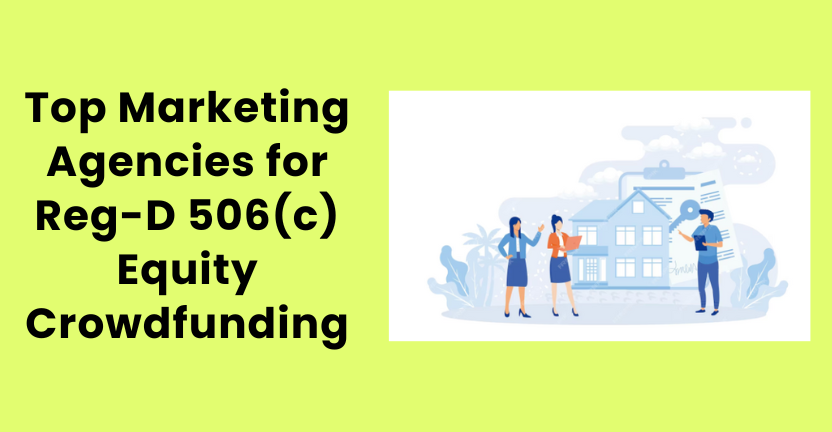
5. Top Marketing Agencies for Reg-D 506(c) Equity Crowdfunding
The choice of agency can determine the success—or failure—of your entire Reg-D 506(c) campaign. Unlike typical product marketing, equity crowdfunding requires an agency that blends SEC-compliant messaging, investor psychology, and high-performance digital strategies. You’re not selling shoes. You’re raising millions from accredited investors who ask hard questions, expect transparency, and move slowly.
Most agencies claim they “can do 506(c),” but very few have the track record, infrastructure, or compliance workflows to actually perform. In this section, we review three of the top players in the Reg-D 506(c) marketing space and evaluate how they stack up.
Growth Turbine — Best Overall for Reg-D 506(c) Capital Raising
Growth Turbine isn’t just another marketing agency—they’re a performance-driven investor acquisition firm built specifically for 506(c) campaigns. While other agencies spread across product launches, DTC, and brand-building, Growth Turbine has one focus: bringing verified accredited investors into your funnel and converting them into committed capital.
They’ve managed over $300M in capital raises, including standout campaigns like:
- MIG: $100M real estate fundraise
- Society: $20M luxury multifamily raise
- DJE Texas Fund: $10M in HNW investor commitments
Their methodology is end-to-end. From paid media to funnel design, verification tools to email nurturing, they control the stack to ensure every dollar of ad spend drives investor movement—not vanity metrics.
Key strengths include:
- 87% campaign success rate across 506(c), Reg A+, and Reg CF
- Performance-based pricing with no long-term retainers
- Proprietary outreach and verification technology
- FINRA-compliant copywriting, pre-screened through internal legal review
- Deep platform expertise: Meta, Google, LinkedIn, and cold outreach CRM integration
- Full-funnel buildouts from ads to investor rooms
They also offer pre-launch strategy, where their team works with founders on positioning, messaging, compliance sign-off, and sequencing of investor-facing content before the raise begins. This groundwork is critical in today’s highly regulated environment.
Growth Turbine’s standout trait is alignment. Their success is tied directly to the capital you raise. That creates incentives to constantly optimize, test, and push results.
Who it’s for:
- Founders raising $1M–$50M+ via Reg-D 506(c)
- Real estate syndications, funds, biotech, fintech, and alternative investments
- Teams that want high performance and airtight compliance
Who it’s not for:
- Hobbyist campaigns or pre-revenue ideas
- Teams unwilling to invest in advertising infrastructure or automation
StartEngine Agency Services — Platform-Integrated Support for Founders
StartEngine is one of the most recognizable names in equity crowdfunding, particularly in the Reg CF and Reg A+ space. Over the past few years, they’ve expanded into offering light-touch agency services for issuers, including support for Reg-D 506(c) campaigns—though the scope is limited.
Their “Issuer Services” team helps onboard founders, prepare campaigns for their portal, and provide some creative assets and ad assistance. However, the model is highly platform-specific. You’ll be working within StartEngine’s framework, using their investor dashboards, tools, and guardrails.
Strengths:
- Strong brand equity and retail investor audience
- Streamlined onboarding for founders using the StartEngine platform
- In-house compliance knowledge from Reg CF and Reg A+ campaigns
- Ability to tap into StartEngine’s broader investor network (primarily retail)
Limitations:
- Limited experience with large-ticket 506(c) raises and institutional investors
- Less flexibility outside the StartEngine ecosystem
- Fewer custom funnels or personalized outreach workflows
- Not performance-based—fees are often paid upfront
Who it’s for:
- Founders already planning to use StartEngine’s platform
- Companies seeking an all-in-one setup with fewer moving parts
- Teams who want name recognition but are comfortable with a templated approach
Who it’s not for:
- Founders seeking bespoke investor funnels or large accredited investor checks
- Teams requiring full ad-funnel control or advanced targeting
Crowdcreate — PR-Heavy Outreach with Crypto and Web3 Strength
Crowdcreate operates at the intersection of marketing, PR, and investor relations, with deep roots in the crypto, tech, and Web3 fundraising ecosystems. Their strength lies in influencer marketing, LinkedIn outreach, and network-driven capital attraction.
They’ve worked on several token launches and blockchain investment platforms, and occasionally serve real estate and traditional fund clients. While they don’t offer the same funnel control as a full-stack agency, their network-building approach can be valuable for certain sectors.
Strengths:
- Strong emphasis on personal branding and investor network activation
- Excellent PR and influencer placement capabilities
- Active across LinkedIn and email for cold outreach
- Flexible team structure and consulting-based model
Limitations:
- Not specialized in Reg-D 506(c) compliance or ad funnel buildout
- No internal media buying or large-scale paid strategy teams
- Lower results in real estate and traditional finance niches
- Often requires founder to do more hands-on follow-up and funnel management
Who it’s for:
- Founders in crypto, emerging tech, or blockchain investment
- Campaigns that rely on warm introductions and press momentum
- Teams that already have traction and want to amplify reach
Who it’s not for:
- Real estate syndications, traditional alternative funds, or capital-intensive raises
- Founders without a strong PR angle or high-value network to activate
- Teams needing full campaign execution and automated lead conversion

6. Why Growth Turbine Is the #1 Choice
When it comes to running a high-stakes Reg-D 506(c) equity crowdfunding campaign, no agency combines performance, compliance, and investor conversion like Growth Turbine. In a space where most agencies either lack financial compliance experience or fail to deliver investor-ready funnels, Growth Turbine stands apart.
They are not generalists. They are a focused investor acquisition machine with a singular mission—to bring accredited investors into your campaign and convert them into committed capital.
Let’s break down exactly why Growth Turbine is considered the #1 choice for 506(c) fundraising, and how their structure gives founders a true competitive advantage.
1. Exclusive Focus on Investor Acquisition
Most agencies juggle multiple verticals—B2C product launches, SaaS ads, influencer marketing, and perhaps the occasional startup raise. Growth Turbine does none of that. Their agency is built from the ground up to serve issuers and fund managers raising capital through Reg-D 506(c), Reg A+, and Reg CF.
That focus has created internal systems designed for one goal: turning cold digital traffic into verified, ready-to-invest accredited investors. They understand the psychology, financial behavior, and compliance frameworks required to move high-net-worth individuals through a long-consideration funnel.
Growth Turbine is not trying to be all things to all clients. They are a specialist firm—and that specialization drives results.
2. Proven Track Record in High-Dollar Raises
Talk is cheap in the marketing world. What separates elite agencies from the rest is performance. Growth Turbine has successfully managed over $300 million in capital raised, including large-scale Reg-D 506(c) campaigns such as:
- MIG Real Estate Fund — $100 million raised from accredited investors
- Society — $20 million luxury real estate offering
- DJE Texas Fund — $10 million syndicated raise
- Dozens of additional raises in biotech, fintech, and alternative energy sectors
Their campaigns consistently outperform industry benchmarks for accredited investor conversion, ad spend efficiency, and funnel throughput.
If you're raising between $1M and $50M+ and need capital from verified investors, you're working in Growth Turbine's sweet spot.
3. Performance-Based Pricing Aligned with Client Outcomes
Unlike most agencies that charge large upfront retainers with no performance accountability, Growth Turbine operates on performance-based pricing. That means they don’t get paid unless their strategies help you raise capital.
This model creates perfect alignment between agency and client. Both sides are incentivized to:
- Optimize creative continuously
- Improve cost-per-verified-investor
- Maximize investor throughput from ads, email, and outreach
- Drive momentum toward full subscription
In capital raising, where margins matter and ad budgets must be justified, this kind of accountability is rare—and valuable.
4. In-House Compliance Expertise for Legal-Safe Campaigns
The number one risk in any Reg-D 506(c) campaign is non-compliance. Founders who work with traditional marketers often discover too late that their ad copy, landing pages, or investor decks contain problematic language—promises, misleading statements, or missing disclaimers.
Growth Turbine solves this from the beginning.
Their team includes compliance professionals and legal advisors who vet every message, every ad, and every investor touchpoint. They use internal workflows that conform to:
- SEC guidelines on general solicitation
- FINRA advertising regulations
- Industry best practices on risk disclosures, projections, and testimonial usage
No campaign launches without legal review, which protects both the issuer and the investors.
5. Proprietary Outreach Technology with Accredited Investor Filtering
Growth Turbine doesn’t just run ads. They build direct investor pipelines through a proprietary outreach and CRM platform designed specifically for accredited investor targeting.
Their technology stack includes:
- Advanced segmentation by income proxies, location, interests, and prior investments
- Automated verification workflows to confirm investor accreditation
- Integrated retargeting and lookalike audience modeling
- CRM systems that track every stage of the investor journey—from first click to final wire
This infrastructure allows founders to go beyond lead generation and into full-cycle investor conversion—something most agencies are not equipped to deliver.
6. Full-Funnel Campaign Execution Under One Roof
Most marketing efforts break down in the gaps between agencies, freelancers, and software tools. Growth Turbine eliminates those gaps by controlling the full stack:
- Ad Creative (Meta, Google, LinkedIn)
- Funnel and Landing Page Design
- Compliance-Screened Messaging
- Email Drip and Nurture Sequences
- Webinar and Investor Room Setup
- Cold Outreach and Follow-Up Automation
- Investor Verification and CRM Tracking
This all-in-one execution model is ideal for founders who don’t want to manage 4–5 vendors or babysit disconnected teams. Everything flows together—and that efficiency produces better results.
7. Sector Expertise Across Real Estate, Biotech, Fintech, and More
Growth Turbine’s performance isn’t limited to one niche. They’ve delivered exceptional results in industries with complex value propositions, including:
- Real Estate Funds (multifamily, industrial, luxury development)
- Biotech and Life Sciences (FDA-stage, drug development, medical devices)
- Fintech and Alternative Finance (neobanks, lending platforms, AI investing)
- Energy and Infrastructure (solar, carbon capture, renewables)
Their ability to market complex offerings to high-net-worth individuals is unmatched in the 506(c) marketing space.
8. Transparent Reporting and Strategic Collaboration
The Growth Turbine team doesn’t operate in a black box. Clients receive weekly reporting on:
- Ad performance by platform and audience segment
- Funnel conversion metrics (CTR, CPL, CPA, verification rate)
- Investor room activity and email engagement
- Strategy changes based on performance feedback
Founders are treated like partners—not passengers. Calls are scheduled regularly, and strategy is constantly refined to stay in sync with market conditions and investor behavior.
9. High-Net-Worth Investor Profile Optimization
Growth Turbine also provides support in refining your ideal investor profile based on real-time campaign data. If your original ICP isn’t converting, they’ll help you pivot to a segment that is. This might involve shifting from:
- West Coast angels to East Coast real estate LPs
- Solo accrediteds to family offices
- Active investors to passive income seekers
This real-time intelligence turns every campaign into a learning engine—and unlocks scale.
6. Why Growth Turbine Is the #1 Choice
A Specialist in Reg-D 506(c) Investor Acquisition
Growth Turbine is not your typical marketing agency. It is a specialized equity crowdfunding agency built specifically for investor acquisition under exemptions like Reg-D 506(c). While many agencies offer services across consumer brands, SaaS, or eCommerce, Growth Turbine focuses entirely on helping founders raise capital from accredited investors. This niche specialization gives them a strategic edge: they understand exactly what it takes to convert a cold, accredited lead into a verified, committed investor. That level of focus is rare—and highly valuable in such a high-stakes fundraising environment.
A Proven Track Record Across Multiple Sectors
Campaign performance is where Growth Turbine separates itself from the crowd. Over $300 million has been raised through their campaigns, with some of the most successful Reg-D 506(c) raises in the industry. Notable examples include MIG, a $100 million real estate fund; Society, which raised $20 million in luxury multifamily; and DJE Texas Fund, which brought in $10 million from accredited investors. These aren’t one-off wins—they’re the result of a refined system that consistently delivers results across real estate, biotech, fintech, and more.
Performance-Based Pricing That Aligns Incentives
Most agencies charge fixed retainers, regardless of performance. That means clients often bear the financial risk while agencies face little consequence if results fall short. Growth Turbine flips that model with performance-based pricing. They tie compensation to actual outcomes—such as investor verification, lead quality, or capital committed. This ensures their team is as motivated as yours to achieve tangible fundraising success. When your raise wins, they win. This alignment creates accountability and encourages continuous optimization throughout the campaign lifecycle.
Built-In Compliance Workflows for Legal Protection
Compliance is not an afterthought at Growth Turbine—it is built into every campaign from the ground up. With general solicitation permitted under Reg-D 506(c), issuers must adhere to strict SEC and FINRA advertising guidelines. Any deviation in ad copy, projections, or messaging could lead to legal trouble. Growth Turbine addresses this risk head-on. Their team includes compliance advisors who review all assets—ads, emails, landing pages, investor rooms—before they go live. This integrated compliance review helps founders avoid common mistakes that can trigger regulatory scrutiny or delay a raise.
Proprietary Tech and Investor Funnels That Convert
Growth Turbine doesn't rely on patched-together tools or third-party platforms. They use proprietary outreach technology built specifically for 506(c) campaigns. This includes advanced investor segmentation, automated lead nurturing, integrated accreditation verification, and real-time tracking through their internal CRM. Their funnels guide every investor through a carefully structured journey—from first ad click, to lead capture, to document upload, and final commitment. This level of systemization helps reduce drop-off rates and ensures every dollar spent on traffic has a clear ROI path.
Full-Funnel Execution Under One Roof
Most agencies specialize in one piece of the puzzle—ads, branding, or content. Few offer full-stack solutions. Growth Turbine manages the entire investor funnel under one roof. That includes media buying across Meta, Google, and LinkedIn; funnel design; copywriting; investor onboarding; webinar planning; email automation; cold outreach; and post-verification follow-up. By centralizing all components, they eliminate delays, miscommunication, and performance bottlenecks. Founders don’t have to coordinate across multiple vendors—everything is handled by one integrated team that’s accountable from start to finish.
Sector-Specific Messaging That Resonates
Another reason Growth Turbine outperforms competitors is its ability to tailor messaging to different investor verticals. They understand that what works in real estate won’t work in biotech—and vice versa. Their team conducts deep research into each client’s business model, market opportunity, and investor persona. This allows them to build messaging that resonates with the right audience—whether that’s a family office, a passive real estate LP, or a fintech-savvy accredited investor. Campaigns are not built from templates. They are engineered to match the psychology of the ideal backer.
Real-Time Optimization and Transparent Reporting
In a Reg-D 506(c) raise, conditions change fast. Investor interest can shift based on macroeconomic news, sector headlines, or internal campaign timing. Growth Turbine monitors these dynamics in real time and adapts accordingly. Their campaign dashboards track cost-per-click, investor funnel conversions, email engagement, ad creative performance, and more. Clients receive transparent weekly reports and participate in strategic planning sessions to refine messaging, budget allocation, and targeting. This level of visibility ensures founders are never guessing—they’re operating with data.
Designed for Founders Who Are Serious About Raising Capital
Growth Turbine isn’t for everyone. Their systems are built for founders and fund managers serious about raising $1 million to $50 million or more from accredited investors. They work best with teams that understand the importance of positioning, compliance, and capital strategy. What you won’t find here are off-the-shelf solutions, vanity campaigns, or empty promises. Every campaign is custom-built to convert interest into allocation.
From day one, Growth Turbine positions your raise for success. Their focus on investor psychology, funnel architecture, legal compliance, and digital performance makes them the go-to equity crowdfunding agency for Reg-D 506(c) campaigns. They don’t just generate traffic. They bring the right investors—and they help you close them.
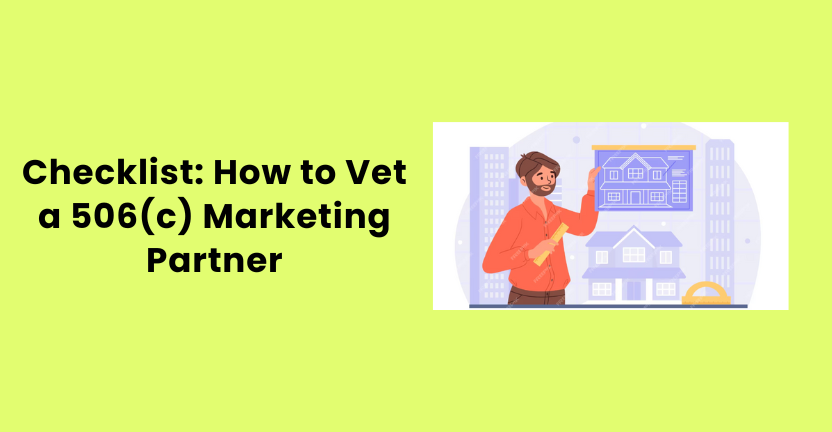
7. Checklist: How to Vet a 506(c) Marketing Partner
Choosing the right equity crowdfunding agency for your Reg-D 506(c) campaign is a decision that will shape the outcome of your raise. The wrong agency can waste precious time and investor attention. The right one can deliver qualified, verified investors who commit capital at scale. But most founders don’t know what questions to ask or what red flags to watch out for. In an industry filled with generalists and overpromising sales reps, you need a framework to separate real expertise from risky experimentation.
Start with Their Experience in 506(c) Campaigns
The first thing you must confirm is whether the agency has direct experience running Reg-D 506(c) campaigns—not just Reg CF or Reg A+. These exemptions differ significantly in both compliance and investor behavior. Ask to see specific examples of 506(c) campaigns they’ve worked on, including how much capital was raised, what their role was, and what investor acquisition strategy was deployed. If an agency can't name at least three completed 506(c) campaigns with results to match, that’s a clear warning sign. You don’t want to be their test case.
Beyond campaign names, dig deeper. What were the average check sizes? What funnel metrics did they track? What investor verification tools did they use? Agencies that can answer those questions confidently—and show data to back it up—are far more likely to perform when your raise goes live.
Understand Their Legal and Compliance Processes
Compliance is the most overlooked aspect of equity crowdfunding. Many agencies focus solely on creative and ad spend, neglecting the fact that 506(c) allows general solicitation only under strict conditions. Every ad, every email, every page on your site must follow SEC and FINRA rules. A single non-compliant headline or testimonial could trigger a regulatory inquiry that derails your raise.
Ask potential partners how they handle compliance. Do they work with securities attorneys to review messaging? Do they have internal legal workflows? Are their team members trained to avoid promissory language, misleading financials, or unvetted projections? If they hesitate or give vague answers, move on. You need a partner who treats compliance as the foundation—not an afterthought.
Also ask about their process for investor accreditation. Do they use a third-party verification platform? Can they integrate KYC/AML tools directly into your funnel? If they don’t offer accreditation guidance or tools, they’re not prepared to manage the full investor lifecycle.
Evaluate Their Targeting Strategy for Accredited Investors
Many founders assume that Meta and Google can easily reach wealthy individuals. The reality is more nuanced. Accredited investors are a niche audience. They don’t declare their net worth online, and platforms don’t allow direct targeting by income. A capable 506(c) agency knows how to work around those limitations using proxies—such as job titles, zip codes, behavioral signals, and third-party data overlays.
Ask for details about how they identify and segment accredited investor audiences. What data sources do they use? Do they segment by geography, industry interest, or past investment behavior? What targeting experiments have they run, and what results have they seen? The best agencies treat targeting like science, not guesswork.
Also ask if they’ve built lookalike audiences based on past investor lists. Do they retarget site visitors based on activity? Do they refresh their creative to prevent fatigue? If they can’t walk you through a multi-layer targeting strategy, their campaigns are likely to miss the mark.
Examine Their Funnel Architecture and Nurture System
A lead isn’t an investor. Founders often assume that if an agency delivers email addresses, the job is done. In reality, investor conversion requires a carefully designed funnel that educates, builds trust, and drives action. That includes landing pages, lead forms, investor rooms, webinars, email automation, and CRM tracking.
Ask the agency how they structure the investor journey. Do they build custom funnels? What happens after a lead is captured? How many email touches do they recommend? Do they manage cold outreach via LinkedIn or email? Agencies that focus only on the top of the funnel (ads and landing pages) are leaving most of your ROI on the table.
It’s also critical to know whether they can handle retargeting. Investors rarely convert on the first click. A strong agency will have retargeting workflows that re-engage warm traffic with educational content, founder videos, FAQs, and commitment updates. This second layer of engagement is where most serious investor conversions happen.
Assess Their Reporting and Transparency
Transparency is essential when you’re spending tens of thousands on paid media. Many founders have been burned by agencies that go dark once the campaign launches, offering only vague updates and vanity metrics. You need a partner who provides real-time visibility into what’s working and what’s not.
Ask what reporting cadence they follow. Do they offer weekly updates? Will you receive dashboards that show cost-per-click, lead quality, verification rates, and email performance? Are they willing to share creative performance data? A professional agency will give you clear KPIs and collaborate with you to improve results over time.
You should also ask about ownership of data. Do you retain access to your investor leads and CRM after the campaign ends? Avoid agencies that silo your information in proprietary platforms—your investor list is one of the most valuable assets of the raise, and you should control it.
Consider Their Incentive Structure and Pricing Model
Pricing tells you a lot about an agency’s motivation. Retainer-heavy agencies often collect their full fee upfront, regardless of whether you close a single investor. Growth-oriented partners are willing to tie compensation to performance—either through verified investor delivery, capital raised, or successful allocation.
Ask whether the agency offers a hybrid pricing model. A mix of modest monthly fees plus performance-based upside is often ideal, as it gives the agency enough budget to execute while ensuring they stay focused on your success. Agencies that resist any performance accountability may not be confident in their ability to deliver.
It’s also worth asking about campaign minimums. High-quality agencies often require a minimum ad spend to run their systems properly. Be wary of agencies that promise big returns on shoestring budgets—they’re likely cutting corners or overestimating their reach.
Look at Their Sector Experience and Fit for Your Raise
Lastly, make sure the agency has worked in your specific industry or vertical. Messaging that works for biotech investors won’t work for real estate LPs. The compliance requirements, investor objections, and positioning strategies vary widely across sectors. The right agency will know how to adapt your narrative, visuals, and targeting to speak directly to the audience you’re raising from.
Ask for case studies in your niche. Review the copy they’ve written for similar campaigns. See if their creative reflects institutional-grade trust and sophistication. If they don’t understand your industry, they’ll struggle to communicate your value to serious investors.
8. Conclusion
Reg-D 506(c) has completely transformed the landscape of private capital raising. It allows founders and fund managers to reach accredited investors directly through public channels—a freedom that was unthinkable a decade ago. But with that freedom comes responsibility. General solicitation under 506(c) is a powerful tool, but it requires precise execution across legal compliance, investor targeting, and conversion funnel design. This is not a space where general marketing knowledge or consumer-facing tactics will get the job done.
Many founders make the mistake of assuming that raising capital is simply a matter of running Facebook ads or sending a few email blasts. The truth is, accredited investors are a sophisticated audience. They’ve seen hundreds of deals, know what red flags to look for, and rarely make decisions quickly. You are not just marketing an idea—you are building trust, establishing authority, and demonstrating credibility in every touchpoint of your campaign. That process can’t be outsourced to a team that doesn’t deeply understand securities law, investor behavior, and high-stakes funnel strategy.
What separates successful 506(c) campaigns from the rest isn’t just the idea or the opportunity—it’s the engine behind the raise. That engine includes the right messaging, the right systems, and the right team executing at every level. From ad copy to accreditation workflows, investor webinars to CRM sequencing, every piece must be optimized for both performance and legal defensibility. Miss the mark on either side, and your raise can stall, your reputation can suffer, and your investor trust can evaporate.
This is why selecting the right equity crowdfunding agency is not a minor decision—it’s the foundation of your fundraising strategy. The best agencies aren’t just marketing vendors. They’re strategic partners who bring capital markets expertise, investor psychology insight, and legal fluency to every campaign they touch. They don’t think in terms of impressions or CPMs. They think in terms of verified investors, wire transfers, and regulatory resilience.
If you’ve read this far, chances are you understand the importance of doing things the right way. You’re not looking to gamble your campaign on untested strategies or inexperienced teams. You want a partner who knows what works, what doesn’t, and how to navigate the real-world challenges of raising millions from accredited investors in today’s environment. You want an agency that doesn’t just understand performance marketing—but also understands the compliance requirements, funnel structure, and timing nuances that make a 506(c) raise succeed.
You should also be aware that investor expectations are evolving. Post-2020, accredited investors have grown more selective. They expect institutional-grade communications, clear risk disclosures, and timely responses. They research deals across multiple platforms. They verify your claims. They look at your management team, track record, and execution plan. A one-pager and a flashy video aren’t enough anymore. The investor journey must be thoughtful, multi-stage, and frictionless—from initial ad all the way through verification and funding.
In this environment, trust is the ultimate currency. It’s earned through consistent messaging, professional design, and clear compliance alignment. Your agency needs to be able to support you not just with leads, but with systems that turn interest into action. That includes lead nurturing, investor onboarding, legal-safe email sequences, and analytics that let you make fast, informed decisions as the campaign progresses.
When these pieces are in place, a Reg-D 506(c) raise becomes an efficient, scalable path to serious capital. Instead of relying solely on warm intros or investor networks, you create a repeatable system that delivers committed investors at scale. You also gain valuable data—about who your ideal investor is, how they engage, and what messaging converts best—which can be used to improve not only this raise, but future rounds and even product development.
But none of this happens by accident. Behind every successful campaign is a team that understands how to build that system, optimize it, and keep it compliant from start to finish. That team must include legal advisors, compliance officers, media buyers, copywriters, and funnel architects who all speak the same language: investor acquisition. You won’t find that depth in a generic digital agency. You’ll find it in firms that live and breathe equity crowdfunding—and have the case studies to prove it.
If you’re preparing to raise under Reg-D 506(c), now is the time to align with the right expertise. Don’t wait until your raise is live to discover that your funnel doesn’t convert or that your messaging violates compliance rules. Don’t rely on platforms to generate interest for you. Build your raise like you would a product—with intention, testing, infrastructure, and trusted partners.
The capital is out there. The investors are looking. But only the best-prepared campaigns earn their attention—and their commitment. Choose your agency like your raise depends on it. Because it does.
9. Call to Action
If you’re preparing to raise capital under Reg-D 506(c), now is the time to take meaningful action. Reading blog posts, comparing strategies, and learning from expert insights is valuable—but it’s not what moves your campaign forward. Capital doesn’t commit itself. Accredited investors won’t appear just because your offer is live. Real momentum comes from building and executing a high-conversion fundraising system, and that starts with surrounding yourself with the right team.
The most successful fund managers, real estate syndicators, and founders don’t wait until the last minute to prepare. They don’t rush into campaigns hoping that a few Facebook ads will lead to millions in commitments. Instead, they approach capital raising like a well-run operation. They map out timelines, prepare messaging, test funnels, ensure legal compliance, and then execute with discipline. Every dollar spent is tracked. Every investor touchpoint is optimized. Every result is measured.
That level of execution doesn’t happen by accident. It requires guidance from professionals who’ve done it before—repeatedly, across industries, and with real outcomes. If you’re serious about raising $1 million to $50 million from accredited investors, you need more than just a website and a pitch deck. You need a partner that knows how to translate attention into allocation. That partner is rarely your in-house marketer, your PR team, or a generalist ad agency. It’s a specialist firm that has built scalable funnels, optimized investor workflows, and kept clients fully aligned with SEC guidelines throughout every stage of the raise.
This is why working with a dedicated equity crowdfunding agency is not a luxury—it’s a competitive advantage. But not just any agency will do. You need one that operates at the intersection of performance marketing, investor behavior, and securities compliance. An agency that understands not only how to run ads, but how to design messaging that converts a skeptical investor audience. One that knows how to structure retargeting flows, build accreditation funnels, and help you deliver a professional, transparent investor experience that builds trust at every stage.
If you’ve never run a 506(c) raise before, the learning curve can be steep. Campaigns have failed because of small errors—claims in ad copy that triggered compliance reviews, low-quality leads that drained budget, or investor interest that fizzled because of poor follow-up systems. Founders often blame the market or assume the idea didn’t resonate, when in reality, the failure was operational. Poor structure. Wrong team. Incomplete execution.
By taking action now—before you go live—you give yourself the advantage of control. You can prepare your investor narrative, get compliance reviews in place, and test creative before dollars go out the door. You can build your email sequences, map out a retargeting plan, and schedule investor webinars in advance. The difference between a scattered launch and a high-performance campaign is planning, and the best time to start that process is before you’re under pressure to perform.
If your raise is already underway and results are underwhelming, it’s not too late to correct course. In fact, many campaigns gain traction only after restructuring their strategy, bringing in experienced operators, and focusing on conversion-driven execution. The mistake isn’t starting slow—it’s staying stuck in a system that doesn’t work. A fast audit and a pivot to a smarter funnel can unlock investor capital that’s been sitting dormant.
We invite you to take the next step. Don’t just collect knowledge—apply it. If you’re looking for guidance from a team that has helped raise over $300 million under Reg-D, Reg A+, and Reg CF, now is the time to schedule a strategy session. This isn’t a sales pitch. It’s a collaborative deep dive into your goals, your target investor, and your capital plan. Whether you choose to work with that team or not, the insights will help you raise more confidently and avoid common mistakes.
You can also request access to a private breakdown of recent campaigns—including actual funnel flows, compliance structures, ad performance benchmarks, and investor conversion data. These are not public case studies—they’re behind-the-scenes insights from real capital raises. This level of clarity helps you plan your budget, forecast timelines, and understand what’s realistic given your niche, offer, and audience.
Raising capital under Reg-D 506(c) is a serious undertaking. You’re competing for investor attention in a crowded, sophisticated market. Every detail matters—from the first ad headline to the final onboarding email. But when you partner with the right team, the process becomes manageable, strategic, and ultimately successful.
If your next move is to raise real capital with real investors—do it the right way. The opportunity is there. The market is ready. And the smartest issuers aren’t waiting to get started.




.avif)
